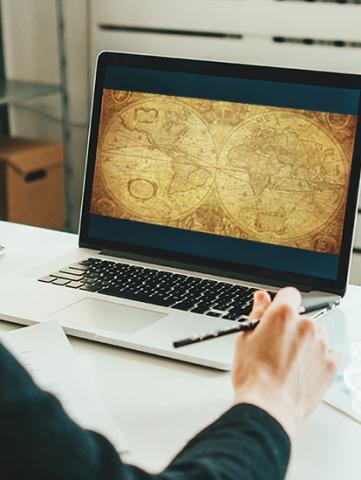

EHNE, the Digital Reference for History Teachers
The French Ministry of Education has made the Encyclopedia of European Digital History (EHNE*) the official partner for online history courses for teachers.
Understanding the past, with historian Olivier Dard, director of EHNE, and Matthieu Lahaye, general inspector of history for the Paris Rectorate.
What are the challenges and objectives of EHNE?
Olivier Dard: EHNE is a bilingual French/English digital history encyclopedia designed for researchers, students, teachers—anyone interested in history. It currently has nearly 700 freely accessible articles written by academics.
With EHNE, we bet on using open science. We felt that by using a short and accessible format, we could present history with scientific rigor and nuances, which would interest a broader public than just researchers. It was clearly a winning bet, since in the last six years we have increased our audience and now have 4000 daily visitors on our site.
What resources are developed by EHNE and how do you distribute them?
Olivier Dard: EHNE relies on rigorous editorial work to make academic texts accessible and to offer a fluid and attractive interface for readers.
In order to reach different types of readers, we vary our media (articles, archival comments, videos, photographs). We invest in social networks and offer our content to several media. With the computer science laboratory at Sorbonne University (LIP6), we are also building an innovative and transdisciplinary project between artificial intelligence (AI) and history, thanks to which we have already tested algorithms on a digitized collection of old photographs (in French).
We have been able to rely on the reputation of Sorbonne University and its international influence to disseminate our content to our readers, of which half are located abroad and 15 percent in the USA.
You are partnering with the French Ministry of Education to become the digital reference for history teachers. What does this mean for you?
Olivier Dard: The 46,000 history teachers in France have been a very attentive readership since the beginning and regularly ask us about certain points in the school curriculum. This is why, in 2019, we decided to create a digital history textbook that would include articles from the encyclopedia and to publish others specifically for the program. This has been reflected very clearly in the reading public.
The proposal by the French Ministry of Education to associate us with Eduscol (a professional website of the French Ministry of Education) is for us a culmination of the work accomplished. It is an extraordinary opportunity for the development of EHNE and a real asset for Sorbonne University’s reputation.
The partnership agreement that has just been signed between Sorbonne University and the French Ministry of Education will allow EHNE to become the reference site for university history in the years to come. We hope that the necessary means will be available to pursue this formidable undertaking, which is reviving the tradition of great encyclopedias.
What attracted the French National Education to this project?
Matthieu Lahaye: We were looking for a major institution like Sorbonne University to develop this type of partnership in history, which already exists in other disciplines such as geography. Our interest quickly turned to EHNE for several reasons: first, because the idea of reviving, in the 21st century, the encyclopedic spirit that is at the foundation of the culture of the Enlightenment and of our European culture, is a project that, in our eyes, makes sense. Secondly, because we wanted to provide history teachers with insights into the various points of the program that are as close as possible to current historical research.
The other major asset of EHNE is the professionalism with which the editors, developers, writers and academics have been able to produce and disseminate their knowledge through a very well constructed site. Finally, things were made all the more easy as EHNE had already begun to build bridges with secondary school teachers by creating notices on the new high school programs.
How will this partnership be translated into concrete terms?
Matthieu Lahaye: What brings us together is the essential role that academics must play in the continuing education of teachers. With the launch of new pages dedicated to teaching history this summer, EHNE will be made up of two components: the Encyclopedia itself, which will continue to develop and the development of pedagogical content related to the encyclopedia. We will thus put online documentary files that will provide both a framework on the various points of the program but also analyses of documents, particularly commentaries on original texts, to help teachers teach history as closely as possible to the sources and thus familiarize students with the critical methods used by historians.
The history-geography group of the Paris Rectorate General Inspection is delighted with this partnership, which will allow us to offer a reference site to inspectors, history teachers, their students—particularly those who follow the specialty course in high school—and more generally to all those who are passionate about our discipline.
Olivier Dard: J’e I hope that this partnership will last for many years. It will enable EHNE to become the reference online encyclopedia of history and a model of open science carried out by Sorbonne University.


